|
The Second National Day Reception (No.38)
11 December 2013
Last year, up to 3110 Indians obtained a working visa (Type B) for Belgium, an all-time high. Most of them seem to be high-skilled engineers working in the IT industry. A local newspaper recently reported that this type of visa is issued to nationals from non-EU countries that have signed a labour agreement with Belgium, and moreover to people that qualify for occupations for which no Belgian workers can be found. Exceptionally, this visa is also issued to people with a university degree or higher and whose annual salary amounts to 38.665 euro or more. Nearly 40% of the people that obtain this visa for high-skilled labour are Indians. What is interesting is that, when looking where they are working in Belgium per region, most Indians work in Flanders (Dutch-speaking region), then in the Brussels capital region and only a few work in Wallonia (French-speaking region). To begin with there are few IT companies in Wallonia, their scale is small even if they exist and French is required in Wallonia (in Flanders they can do their work in English). For an Indian, the income level in Belgium is more than 3 times that of India for the same work and many of them send more than half of their salary to their family in India. At present, the demand for IT engineers is high in Belgium and as there are still more than 10.000 posts-wanted, more and more Indian nationals will join in this industry. By the way, speaking of the situation in Japan, according to statistics of the Ministry of Justice, 21.500 Indian nationals were living in Japan in 2011 (in passing, the number of Belgians living in Japan was 689 in the same year). Among these, 7760 people’s status of residence is “technically skilled labour/ engineering”. Including their families, it is estimated that nearly half of the Indian residents in Japan are high-skilled people working in the IT-sector.
< Elaborate Plans for the Second National Day Reception >
Last year December, when I held the first National Day Reception soon after my arrival, I was very perplexed about the congestion in the venue (See Ambassador’s Chat No. 3). Therefore, this year, I decided to invite the Japanese residents altogether to the New Year’s party in January and took the liberty to limit the guests to Belgian people and members of the diplomatic corps. As a result, the total number of participants to the reception held on the 10th of December decreased slightly to fit the space of the residence. My apologies to the Japanese residents that attended this reception in the previous years, but I do hope that they will understand the circumstances and attend the New Year’s party to be held on the 9th of January.
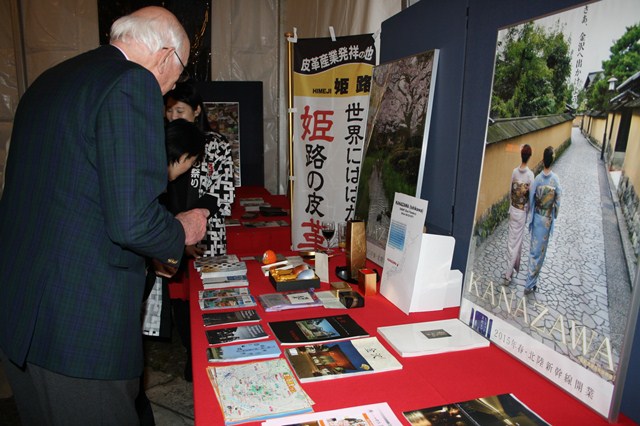 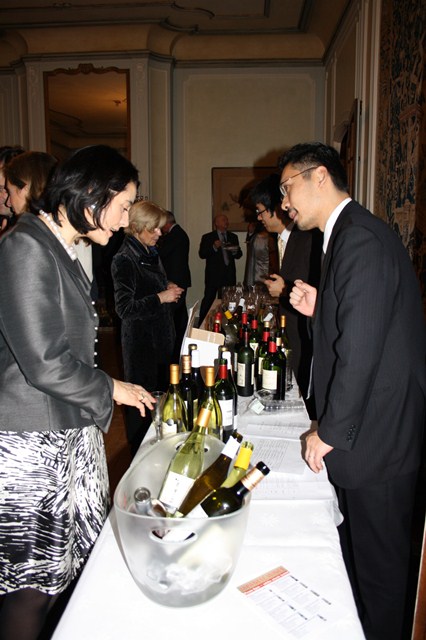 So, a new idea for this year’s reception was to create a corner to introduce Japanese local cities that have a sister city relationship with a Belgian city. 5 cities, Kanazawa, Himeji, Komatsu, Nagakute and Yuki, responded positively to the Embassy’s suggestion and displayed local posters, brochures and products. Also, another idea was to set up a corner for Japanese wine tasting in addition to the introduction to Japanese sake corner that we had last year. The guests got to taste 4 red wines, 4 white wines and one rosé from Koshu, amongst others, in Japan. It was a great succes. So, a new idea for this year’s reception was to create a corner to introduce Japanese local cities that have a sister city relationship with a Belgian city. 5 cities, Kanazawa, Himeji, Komatsu, Nagakute and Yuki, responded positively to the Embassy’s suggestion and displayed local posters, brochures and products. Also, another idea was to set up a corner for Japanese wine tasting in addition to the introduction to Japanese sake corner that we had last year. The guests got to taste 4 red wines, 4 white wines and one rosé from Koshu, amongst others, in Japan. It was a great succes.
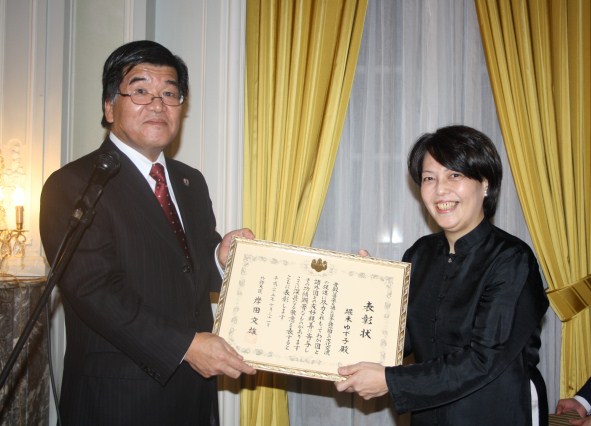 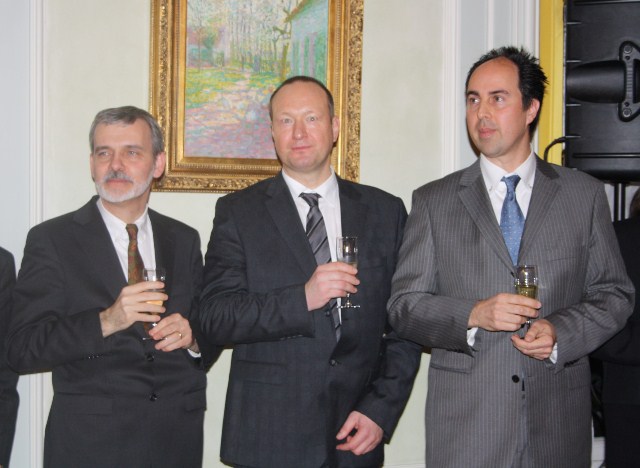 Finally, on the occasion of this reception, we had an award ceremony for Mrs. Yuzuko Horigome, a Japanese violinist living in Belgium, who was commended this autumn by Mr. Kishida, Minister of Foreign Affairs, for her contribution to the development of friendly relations between Japan and Belgium. Enthusiastic applause broke out and Mrs Horigome herself expressed in her acceptance speech her determination to further promote the development of Japan-Belgium relations. Also, I awarded a certificate of appreciation and a memorial plaque as a Head of Mission Commendation to three people: Mr. VAN OVERSTRAETEN, Vice-President of the BJA, Prof. VANOVERBEKE at the Catholic University of Leuven (KUL) and Prof. THELE at the University of Liège. Each recipient gave a speech as well. Finally, on the occasion of this reception, we had an award ceremony for Mrs. Yuzuko Horigome, a Japanese violinist living in Belgium, who was commended this autumn by Mr. Kishida, Minister of Foreign Affairs, for her contribution to the development of friendly relations between Japan and Belgium. Enthusiastic applause broke out and Mrs Horigome herself expressed in her acceptance speech her determination to further promote the development of Japan-Belgium relations. Also, I awarded a certificate of appreciation and a memorial plaque as a Head of Mission Commendation to three people: Mr. VAN OVERSTRAETEN, Vice-President of the BJA, Prof. VANOVERBEKE at the Catholic University of Leuven (KUL) and Prof. THELE at the University of Liège. Each recipient gave a speech as well.
Furthermore, at the beginning of the reception, there was a performance by two Shamisen (three-string instrument) players who happened to visit Belgium, so the guests that arrived early were able to enjoy Japanese music. Well, I need to think about new ideas for the next National Day Reception one year from now. However, whether I will still be in Belgium by that time is uncertain.
< VIP’s from the Japanese Business World to Visit Belgium >
Last week, I invited Takao Kusakari, Counsellor of NIPPON YUSEN KAISHA (NYK) to my residence where we had an informal talk about the recent Japan-Belgium relations and the global state of maritime transportation business. Counsellor Kusakari was president of NYK for about 5 years from 1999 and then chairman until 2009. After his retirement at NYK, he was appointed president of The Japan-Belgium Society and since one year ago, as Chairman of the Market Council, he is committed to strengthen the economic ties with the three countries of the Benelux. As there are the two large hub ports of Antwerp and Rotterdam, these countries have a strong link with marine transport companies. NYK has a long company history dating back to 1870 and now has become a huge shipping company worldwide. At this meeting, I heard valuable stories ranging from the significant impact of the changes in the global energy situation on the maritime industry to anti-piracy measures and the problem of the Arctic Ocean Route.
And this week, I welcomed Mr Hajime Sasaki, Honorary Advisor of NEC to the Embassy. He has served as the Chairman of NEC for about 10 years since 1999, while being at the same time a co-chairman of the Keidanren Europe Committee. He also served as the Chairman of the Electronics and Information Technology Industries Association of Japan and the Communications Industry Association of Japan. On the occasion of his visit to Paris for a meeting, he visited Belgium as well. NEC does not have a factory or a sales network in Belgium, but they have opened an office in order to follow up, among others, on the movement in the EU’s IT regulations. I took this opportunity to tell him how important it is to promote cooperation for the international rule-making between Japan and EU.
< Belgium’s Attractive Niche Industry >
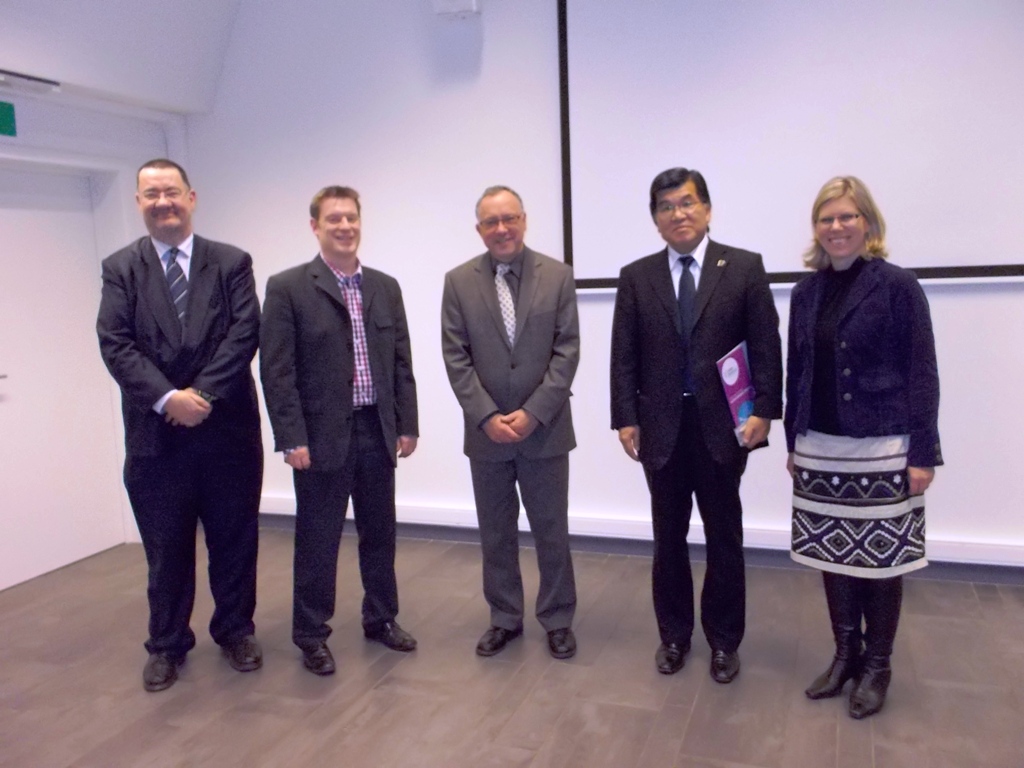 End of last month, I visited a Science Park on the outskirts of Liège and I was intrigued by the story about the niche business development by two Belgian companies. First I had a meeting with a representative of TAIPRO, a company specialized in micro-design and packaging and a spin-off of the University of Liege. The progress from university research to commercialization was made last year and automatically controlled manufacturing equipment was introduced this year. There are 6 employees, including the young CEO Michel Saint-Mard, but he has the ambition to increase the number of employees to more than 10 to be ready for mass production next year. Having already business relationships with neighbouring European countries such as France and Italy, they are looking forward to the future. End of last month, I visited a Science Park on the outskirts of Liège and I was intrigued by the story about the niche business development by two Belgian companies. First I had a meeting with a representative of TAIPRO, a company specialized in micro-design and packaging and a spin-off of the University of Liege. The progress from university research to commercialization was made last year and automatically controlled manufacturing equipment was introduced this year. There are 6 employees, including the young CEO Michel Saint-Mard, but he has the ambition to increase the number of employees to more than 10 to be ready for mass production next year. Having already business relationships with neighbouring European countries such as France and Italy, they are looking forward to the future.
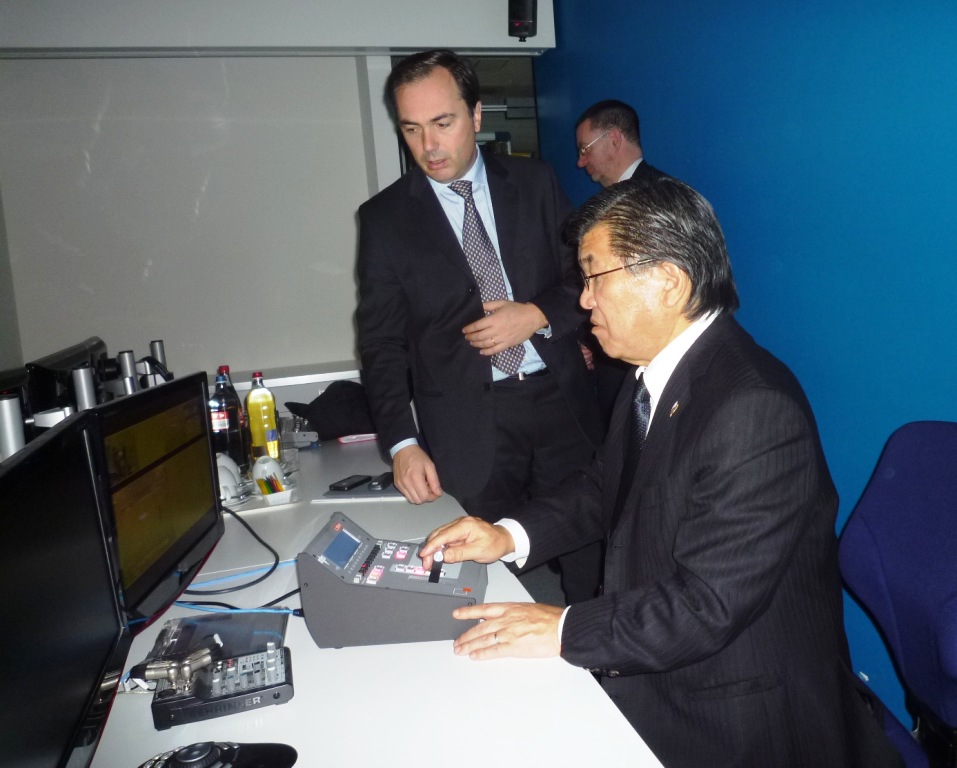 Next, I visited the headquarters of a medium-sized company called “EVS”, which is developing image editing software and video server to store images for sports coverage on TV. Founded 19 years ago, they have 21 offices in 16 countries worldwide and have grown into the world leader in the field of video servers for sports broadcasting. EVS’ servers are often used in televised sporting events on international level, from the Olympic Summer and Winter Games to the Soccer World Cup. In case of the Soccer World Cup, more than 30 TV cameras are set up in the stadium where images are transferred to nearly 20 monitor screens in large trucks that are parked next to the stadium, to be edited into a single image for television broadcasting. The software (server) that edits freely from replay to slow-motion is a device that is developed by EVS. There are 482 employees and last year’s sales amounted to 138 million euro, very admirable indeed. In relation to Japan, EVS has concluded service contracts with NHK and several commercial TV stations. According to Vice-President Geoffroy d’Oultremont, the selling points of this device are the reliability of the server and its user-friendliness. Next, I visited the headquarters of a medium-sized company called “EVS”, which is developing image editing software and video server to store images for sports coverage on TV. Founded 19 years ago, they have 21 offices in 16 countries worldwide and have grown into the world leader in the field of video servers for sports broadcasting. EVS’ servers are often used in televised sporting events on international level, from the Olympic Summer and Winter Games to the Soccer World Cup. In case of the Soccer World Cup, more than 30 TV cameras are set up in the stadium where images are transferred to nearly 20 monitor screens in large trucks that are parked next to the stadium, to be edited into a single image for television broadcasting. The software (server) that edits freely from replay to slow-motion is a device that is developed by EVS. There are 482 employees and last year’s sales amounted to 138 million euro, very admirable indeed. In relation to Japan, EVS has concluded service contracts with NHK and several commercial TV stations. According to Vice-President Geoffroy d’Oultremont, the selling points of this device are the reliability of the server and its user-friendliness.
< A Holiday of the German-speaking Community >
Last month, a celebrative event by the German-speaking Community was held in Brussels and I attended as a member of the diplomatic corps. There is a small German-speaking region (less than 1% of the national population) in the far-eastern part of Belgium and every year they hold a celebration on the 15th of November in accordance with the “King’s Day”. This region was ceded from Germany to Belgium after the First World War and they seem to have a firm footing as Belgian nationals now, nearly a hundred years later. The celebration was jointly organized by Mr Alexander Miesen, President of the Parliament of the German-speaking Community and by Mr Karl-Heinz Lambertz, Minister-President of the German-speaking Community. Both of them gave their greeting speech in German and French. I have previously driven through the suburbs of Sankt-Vith (180km east of Brussels, 9300 inhabitants) in the German-speaking region and shops signs and road markings are of course in German. The menu of the restaurant I stopped by was in German as well, the clerks also spoke German, so I had the illusion of doing some sightseeing in Germany. Most of the area is countryside and hills and I was very impressed by the beauty of the towns. The church I happened to visit in the town was a Lutheran one where the difficulties of the lives of the people that are living as a minority came to mind. Although the country called Belgium is small, the true state of affairs is anyhow complicated…
|

